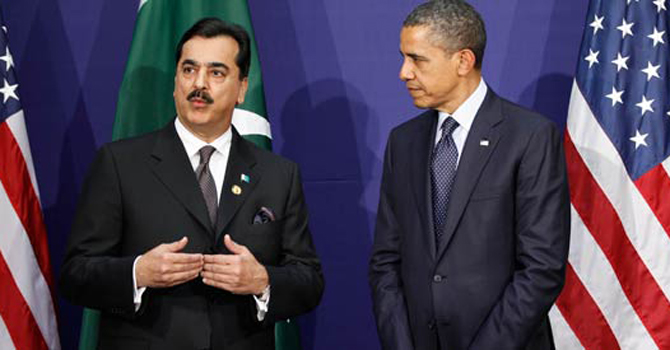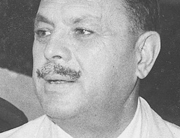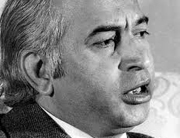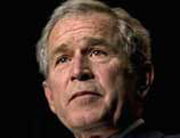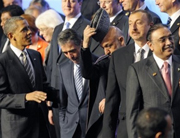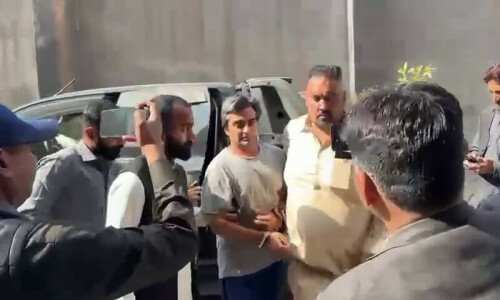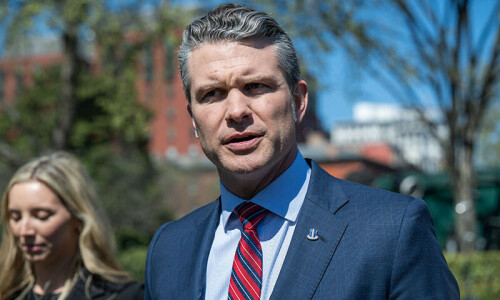United States of America remains one of the first countries to have established diplomatic ties with Pakistan. Although the relationship dates back to October 20, 1947, it can be extrapolated that the relations have been based strictly on military and economic support.
During the initial years of Pakistan, the country had the options of building allegiance with Soviet Union or United States, however, Pakistan opted for the latter.
1950-1953: Pakistan’s first prime minister, Liaquat Ali Khan visited United States to meet president Harry S Truman. It is alleged that during PM Khan’s first visit to US, president Truman requested Pakistan’s premier to let the CIA formulate a base in Pakistan, strictly to keep an eye on the activities of Soviet Union—a request which was not granted by Khan.
Throughout the course of these years many officials from Pakistan such as commander-in-chief Ayub Khan, foreign minister Zafrullah Khan, foreign secretary Ikramullah, finance minister Ghulam Muhammad, defence secretary Sikander Mirza and special envoy Mir Laiq Ali visited US, aiming to receive financial aids from the country.
1954: Pakistan signed Mutual Defense Assistance Agreement with the United States in May. Under the agreement, many Pakistani soldiers went to United States for training whereas US also established a Military Assistance Advisory Group (Maag) in Rawalpindi.
1956: President Dwight Eisenhower requested prime minister Suhrawardy to lease Peshawar Air Station to the American Army for keeping an eye on soviet Union and its ballistic missile programme. The request was granted by the prime minister.
1960s: During the decade, the pro-American sentiments in Western side of Pakistan were at an all time high. However, the military and financial assistance was directed more towards West Pakistan, which caused an uproar and feeling of distrust in East Pakistan.
Ayub Khan allowed United States to fly spy mission to Soviet Union from Pakistan’s territory and accompanied by his daughter visited United States of America.
http://www.youtube.com/watch?v=R7HwKD3XGUU
United States increased the amount of aid Pakistan was designated to receive from the consortium of Pakistan, half a billion dollars of which were lost in 1965’s Indo-Pakistan war—war staged to cause a rebel in Indian occupied Kashmir. The war also led US to place economical and military embargoes on Pakistan, which resulted in an economic collapse.
1971-1974: Being an important ally for US during the cold war, United States supported Pakistan, despite the arms embargo. Pakistan also assisted president Richard Nixon in making his first visit to Peoples’ Republic of China.
During 1971’s war, US is speculated to have provided Pakistan with arms and military aid, in order to discourage India from penetrating further into the cities of Pakistan because losing Pakistan meant losing an important ally in the soviet war.
Moreover, as per the elections result, Zulfiqar Ali Bhutto was elected as the president of Pakistan and later on became the prime minister in 1974.Although Bhutto was considered a socialist, he was a close and respected friend of president Nixon, which went in Pakistan’s favour.
1976-1979: President Jimmy Carter, an anti-socialist, won the presidential election of US and announced to seek a ban on nuclear weapons.
Bhutto lost the favours he enjoyed whilst Nixon was US president as Carter did not appreciate his policies and tightened already placed embargoes on Pakistan. However, Bhutto managed to procure items to enhance his atomic bomb project. President Carter and his administration allegedly threatened Bhutto to disrupt the process of atomic proliferation and research to which the latter did not agree, leading to his differences with the Americans.
1979-1988: During Zia ul Haq’s regime, Pakistan and United States enjoyed a warm and congenial relationship, which was primarily based on military ties and advancements. During the decade, US, along with CIA and ISI, launched billions of dollars worth of operations to prevent Soviet forces from further advancing into the region.
It is during this period that United States granted billions of dollars to Pakistan in the name of military and economical aid. By the year 1981, Pakistan was discussing a $3.2-billion aid package with United States and in 1987 Pakistan became the second largest recipient of aid after Israel.However, by the end of General Zia’s regime, Congress adopted Pressler amendment. The amendment banned major military and economical aid to Pakistan unless the state was able to justify and provide sufficient evidence that the funds are not being used for nuclear proliferation.
However it is alleged that although Pakistan disclosed that it could enrich uranium and assemble a nuclear device in 1984 and 1987 respectively, the sanctions were not imposed till 1990.
1990: US, under the Pressler amendment, imposed sanctions on Pakistan, as the country by then had lost its strategic importance in soviet war.
1992: The relations between US and Pakistan plummeted further when US ambassador Nicholas Platt, warned Pakistan of being included into state sponsors of terrorism list, in case it continued to support militants causing trouble in India.
1995: Benazir Bhutto visited United States and requested president Bill Clinton to lift the embargoes on Pakistan and launch a joint operation to eradicate militancy from the region. As a reaction to Bhutto’s proposal, Brown amendment, which provided for the delivery of $368 million of military equipment purchased but not received by Pakistan before the imposition of Pressler amendment sanctions in 1990, was passed; however, the sanctions on arms were not lifted.
1998: Prime minister Nawaz Sharif conducted nuclear test in Balochistan, in retaliation to similar tests conducted by India, which invited the wrath of Clinton’s administration on both the countries. President Clinton imposed sanctions under Glenn amendment on India as well as Pakistan.
Glenn amendment included suspension of aid, including economic development assistance, credits and credit guarantees by the US government, US bank loans to the governments of India and Pakistan, loans from international financial institutions, such as the IMF and World Bank, and exports of dual-use nuclear or missile items.
However, in July of 1998, US lifted the sanctions on both the countries for purchasing agricultural products from US farmers. Later in the year President Clinton exercised his waiver on lifting restrictions on the activities of US banks in Pakistan.
2001: After the 9/11 attacks and US’s invasion in various countries to eradicate militancy, Pakistan became one of the most important strategic allies for United States.
Initially Pakistan tried to strike a negotiation deal with Taliban and al Qaeda members to handover Osama bin Laden to American authorities. However, when negotiations failed, Pakistan allowed American army to use its military bases for launching attacks on Afghan soil.
However, President Pervez Musharraf confessed that the country had no option but to support United States as it had threatened Pakistan of “bombing it into stone age” if it did not join the fight against al Qaeda.
Simultaneously in 2001, US officials introduced a bill to lift all the sanctions, previously imposed on Pakistan under Pressler and Glenn amendments.
http://www.youtube.com/watch?v=tVo9JorURws&feature=fvwrel
2003: United States officially forgave $1 billion worth of loan it had granted to Pakistan in a goodwill gesture and appreciation for Pakistan’s cooperation.
2004: President George Bush officially declared Pakistan as a non-Nato ally granting it the authority to purchase strategic and advanced military equipments.
Since 2004, US army has launched various drone strikes on the north-western side of the country. The drone strikes aim to target Pakistani Taliban and supporters of al Qaeda, however, the strikes have also resulted in latge civilian deaths and caused much opposition from Pakistanis.
2007: A report was issued in which Pakistan was accused of using aid money provided by US to Pakistan for its cooperation on war on terror, for strengthening its defence against India.
2008: The trust, on both sides, has been missing since the war on terror started as US on several occasions has accused Pakistan Army to tip the Taliban and pro-Taliban factions off on US operations.
In the June of 2008, an air strike by the US Army killed 11 paramilitary soldiers of Pakistan Army Frontier Corps, along with eight Taliban. The strike and deaths instigated a fierce reaction from Pakistani command calling the act to have shaken the foundations of mutual trust and cooperation.
2009: President Musharraf confessed that the billions of dollars of aid that Pakistan received from United States, for being a partner in war against terror, were diverted and channelled in order to build better defence mechanism against India.
The famous Kerry-Lugar Bill, which invited much controversy and criticism, was passed in the October of 2009. The bill entailed the approval of granting $7.5 billion of non-military aid, if the command of the country accepted certain condition. The bill clearly showed US’s distrust in Pakistan’s military command and considered Pakistani Taliban more threatening than Afghan Taliban, amongst many other essential points.
http://www.youtube.com/watch?v=N1udYqw2Ey4&feature=plcp
2010: In the beginning of the year, Pakistan Army in a joint operation with US intelligence agencies captured Mullah Abdul Ghani Baradar, a famous Taliban commander, from the tribal belt of Pakistan. The success of the operation was hailed by the United States and Pakistan was praised for its utmost cooperation.
2011: In the beginning of 2011, Raymond Davis, a CIA agent in Pakistan killed two Pakistani men in Lahore, claiming that they came to rob him. Davis was taken into custody for killing civilians, however, American officials claimed that he was entitled to diplomatic immunity and must be released immediately.
Raymond Davis was later acquitted of the murder charges and was sent to United States.In the May of 2011, Osama bin Laden was killed in an operation conducted by US Navy Seals in Abbottabad, Pakistan.
President Barrack Obama claimed that the information pertaining to the operation conducted in Abbottabad was not shared with Pakistan Army. However, ISI claimed that the operation was conducted jointly, a claim which was blatantly denied by President Asif Ali Zardari.
http://www.youtube.com/watch?v=R9i4m_ohTTw&feature=relmfu
Since the war on terror started in 2001, Pakistan has received an estimated amount of $20 billion from United States; however, in the wake of OBL’s raid US withheld $800 million of aid to Pakistan.
US-Pakistan relations plummeted again when 24 Pakistani soldiers died in an air strike by the US Army. Afghan and US officials claimed that the firing was a result of the attack launched from the Pakistani side of the border, however, the Pakistani military and government denied the claims.
As a result of the attack, Pakistani government ordered US army to evacuate Salala air base which was being used to launch offensive on Taliban and militants. Moreover, the government also halted Nato supplies for United Sates.
2012: Since the beginning of 2012, various political parties along with the military command of the country, met and held discussions on restoring Nato supplies. Diplomats from United States also tried to reduce the friction.
Prime Minister Yousuf Raza Gilani said that the supplies were blocked without any pressure and will be restored with consensus.
Moreover, Nato Secretary General Anders Fogh Rasmussen urged Pakistan to reopen Nato ground supply routes to Afghanistan. However, Rasmussen also said that Pakistan had not been invited to the crucial 25th Nato summit to be held in May in Chicago.
Simultaneously, US Senator John Kerry, a leading proponent of US aid for Pakistan, said that Pakistan needs to be more cooperative, in order to eliminate Taliban sanctuaries from the country.
However, top Pakistani leaders decided to meet on May 15, in order to discuss ending a blockade of foreign military supply routes into Afghanistan and repairing US relations, signaling a rapprochement ahead of a Nato summit.
Simultaneously, in a sudden shift in events, Nato, on May 15, said that it will invite President Zardari to the alliance’s summit in Chicago, after the country’s foreign minister proposed reopening its Afghan border to Nato military supplies. President Zardari accepted the invitation and decided to attend the summit.
However, on May 18, US lawmakers in the House of Representatives debating the National Defence Authorisation Act voted 412-1 for an amendment that could block up to $650 million in proposed payments to Pakistan unless Islamabad lets coalition forces resume shipment of war supplies across its territory.However, on the same day, four containers laden with supplies for the US Embassy in Kabul crossed into Afghanistan from Pakistan via Torkham border post.
A local official while confirming supplies to the US Embassy via Torkham said he could not say when the cargo had been transported.
“Pakistan government has never put restriction on the transportation of supplies for the diplomatic missions, including the American Embassy in Kabul,” a senior official, who was dealing with the matter, said.
“Ban on the transportation of Nato supplies is still intact.”
Simultaneously President Zardari arrived in Washington on May 19 to attend the Nato summit in Chicago. However, both the countries were unable to strike a conclusive deal on the restoration of Nato supplies as the summit ended.
In a fresh warning to Pakistan, a Senate panel on May 23 approved a foreign aid budget for next year that slashes US assistance to Islamabad by more than half and threatens further reductions if it fails to open supply routes to Nato forces in Afghanistan.Sen Patrick Leahy, a Democrat and the chairman of the subcommittee, and the panel’s top Republican, Sen Lindsey Graham, said money for Pakistan was cut 58 per cent as lawmakers questioned Islamabad’s commitment to the fight against terrorism.
Moreover, the Senate Appropriations Committee, on May 24, voted to cut aid to Pakistan by a symbolic $33 million – $1 million for each year of jail time handed to Shakil Afridi, a Pakistani doctor who allegedly assisted the Central Intelligence Agency (CIA) in finding Osama bin Laden.
However, the United States agreed to reimburse $1.18 billion or almost 75 per cent of the claims Pakistan has submitted for the expenses incurred in the fight against militants along the Afghan border.
The approval showed that despite increased tensions, the US financial assistance to Pakistan has continued although it is becoming increasingly difficult to get congressional support for helping Pakistan.
Secretary of Defense Leon Panetta, on June 7, said that the United States was running out of patience with Pakistan over safe havens of insurgents who attack US troops across the border in Afghanistan.
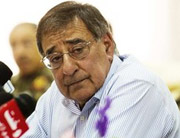
On June 8, US Assistant Defence Secretary Peter Lavoy arrived in Islamabad, in a fresh attempt to bring an end to a six-month blockade on Nato supplies, crossing into Afghanistan.
However, on June 11, the United States withdrew negotiators from Pakistan after talks failed to produce a deal on reopening vital Nato supply routes into Afghanistan. Sherry Rehman, Pakistan’s ambassador to the United States, still sounded optimistic and said that the return of an American negotiating team from Islamabad, where it worked with Pakistani counterparts on revival of the Nato supply routes, does not represent an institutional US pullout.
Moreover, Panetta ruled out an apology over an air strike last year that killed 24 Pakistani soldiers and badly set back efforts to improve US-Pakistani ties, saying it was “time to move on.”
Gen John Allen, the top commander of American and Nato forces in Afghanistan, visited Pakistan on Wednesday, amidst heightened tensions between the two countries.

Pakistan, on July 3, agreed to reopen key supply routes into Afghanistan ending a bitter stand-off after US Secretary of State Hillary Clinton said she was sorry for the loss of life in a botched air raid.
A US official said that as part of the deal Washington will release about $1.1 billion to the Pakistani military from a US “coalition support fund” designed to reimburse Pakistan for the cost of counter-insurgency operations.
Moreover, US Secretary of State Hillary Clinton said on July 8 that the United States and Pakistan were putting past tensions behind them to focus on the future, after meeting her Pakistani counterpart Hina Rabbani Khar in Tokyo.
It was the first meeting between Clinton and Khar since the two countries last week struck a deal to re-open supply routes, closed for seven months following a US attack in which 24 Pakistani soldiers died.
President Barack Obama, on July 17, named Richard G Olson to be the US ambassadors to Pakistan, tasking him with shaping highly sensitive relationships after US troops pull out.

Moreover, Pakistan received $1.1 billion dollars from the United States for its fight against militants, the first installment of its kind since December 2010 on the same day.
The agenda of the meeting was focused on improving security along the border between Afghanistan and Pakistan.
Pakistan’s Ambassador to the United States Sherry Rehman met with Congressman Dan Burton on August 3, a Republican from Indiana, and discussed ways to enhance Pakistan-US relationship.
The United States and Pakistan reached an understanding on joint operations against the Haqqani network on August 5, However a joint decision could not be agreed upon.
The sources said the issue of cross-border attacks, by the Haqqani network into Afghanistan and by TTP into Pakistan, was discussed in a series of meetings between senior US and Pakistani officials during the week.
The US State Department confirmed on August 23 that an American diplomat had a meeting with Pakistani officials at the Ministry of Foreign Affairs in Islamabad as Pakistan lodged its first formal protest with the United States over drone strikes.


